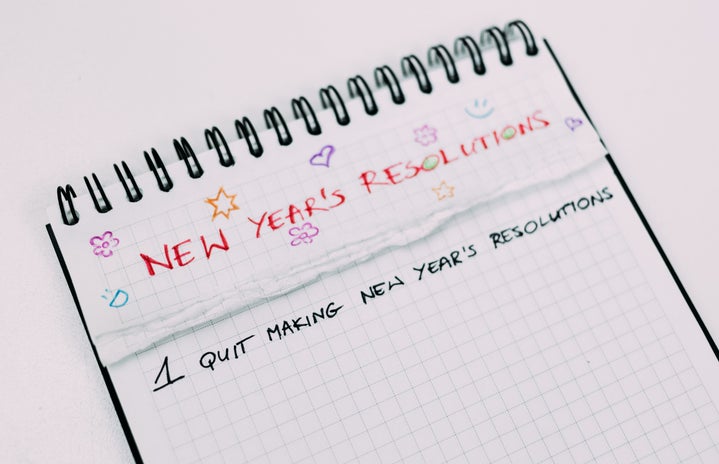Every time a new year rolls around, people all over the world begin to set ‘resolutions’. This, in theory, sounds promising, but a lot of the time, the ‘resolutions’ we set—which are magically meant to transpire over the course of the new rear—are ambiguous and largely unreasonable (i.e. “get rich”, “get fit”, “be successful”, etc). And when we don’t meet these resolutions, we may feel guilt, anxiety, and often feel worse than when we first started.
People are obsessed with the outcome of their resolutions, and not so much with the process itself. When you do this, you may feel like you’ve failed for a large majority of your journey because of the comparison of where you are now versus where you want to be. To avoid this, try shifting your focus: instead of setting resolutions, set goals.
Setting goals, rather than resolutions, are a much healthier alternative. Simply enough, goals are specific, whereas resolutions are usually general and vague. By setting goals for the upcoming year, your actions will be more realizable, which is what makes them more effective.
Now that the new year has already rolled around, you may be wondering: I’ve already made my resolutions, I don’t necessarily want to change them, but how can I turn them into goals?
I recommend using the SMART method (break out your grade 10 business textbook here). SMART goals are Specific, Measurable, Achievable, Relevant, and Timely.
Let’s break it down:
Specific
Think about this step as the mission statement for your goal. Similarly to what you’ve learned in your English classes, you have your five ‘W’ questions:
- What do I want to accomplish?
- Why is this goal important to me?
- Who will be involved?
- Where is this going to take place?
- Which resources do I need to accomplish this goal?
Example: Rather than making a resolution for yourself along the lines of “I want to be fit”, a specific goal for the upcoming year could be, “I want to improve my endurance, so that I can feel stronger and be healthier”.
Measurable
In order to remain focused and to feel the thrill of moving closer to achieving your goal, you will want to create measurable goals. Creating measurable goals will provide a way to measure progress, thus making it more tangible.
Example: You may measure your goal of acquiring fitness skills by aiming to complete a particular amount of training courses.
Achievable
Your goals are meant to motivate you, not discourage you. In order for your goals to be successful, they must be achievable. If you create an achievable goal, you will be able to answer these questions:
- Can I achieve this goal?
- How will I accomplish this goal?
- How realistic is the goal (taking into consideration other constraints)?
Example: Do you have the time to complete your goal? Are there certain resources you need and are they available to you? Do you have financial constraints? Remember that it’s okay not to have everything you need to accomplish your goal at your disposal. Take the time to get what you need in order, but be patient (both with the situation and with yourself).
Relevant
Your goal must align with broader, and other relevant goals. If your goal is relevant, you will be able to answer “yes” to the following questions:
- Is this goal worthwhile?
- Does this goal match my other needs?
- Is this goal applicable in my current environment?
Example: If your goal is to put effort into cooking more nutritious meals, ask yourself: “Do I have time to dedicate X amount of hours to meal-prepping every week? Does this goal match my other efforts and/or needs? Would doing this make my other goals, like budgeting, for example, more difficult?”.
Timely
Anyone can set a goal, but setting a goal that is time-bound is another story. If your goal lacks realistic timing, it is unlikely you will accomplish what you want. Set a target date, and ask yourself:
- When will I realize this goal?
- What can I do 4 weeks from now?
- Where do I want to be 6 months from now?
Example: If your goal is to learn to play the guitar, make sure you’re allowing yourself enough time to learn, practice, and grasp how to play a new instrument. Do you need lessons? Will you join a band? How long do you think this will take you?
Takeaways
Following these guidelines will help you turn any resolution into an attainable goal. These steps will help you clarify your ideas, focus your efforts, and evidently increase your chances of achieving what you want this year.
This year (and beyond) is your time to shine. Make choices that will better your growth, not disadvantage it. We grow through self-evaluation, observation, and change. But setting unrealistic ‘resolutions’ won’t get you anywhere.
Let’s be real… You may not get a six-pack in a month. And you may not earn enough money in 2022 to set yourself up for the future. But that’s completely fine. Don’t put yourself down for taking time to get where you want to be. Instead of obsessing over your New Year’s resolutions this year, focus on your goals. Goals for your health, happiness, and wellbeing. Trust me, it’ll be worth it.


